Have To Vs Must Vs Should
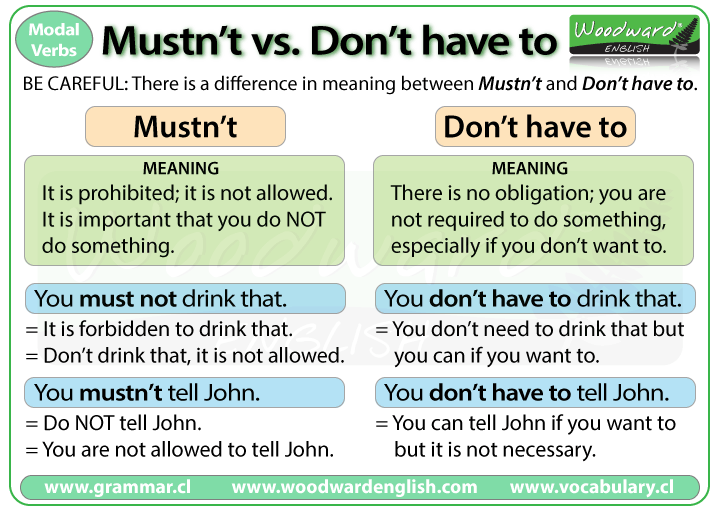
Must English Grammar
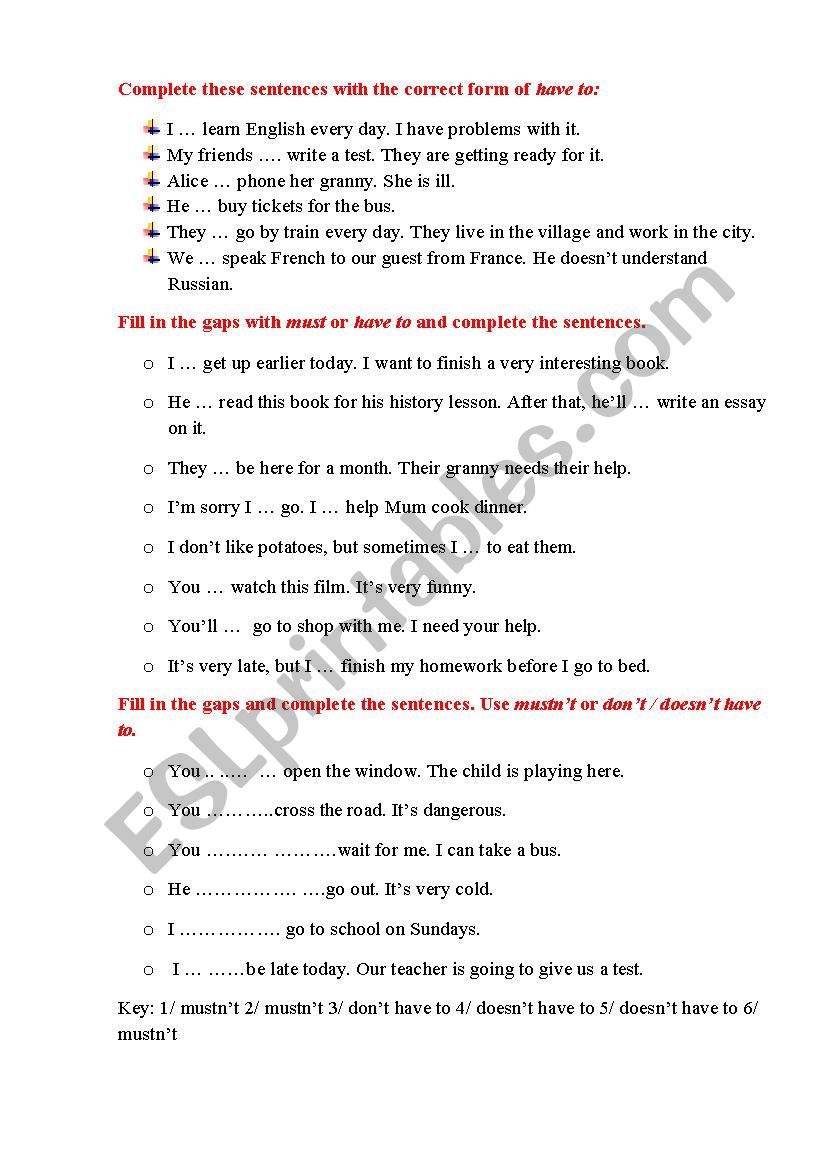
Have To Vs Must Esl Worksheet By Natalya Zav
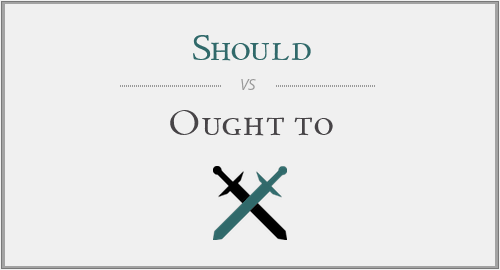
Should Vs Ought To Vs Must
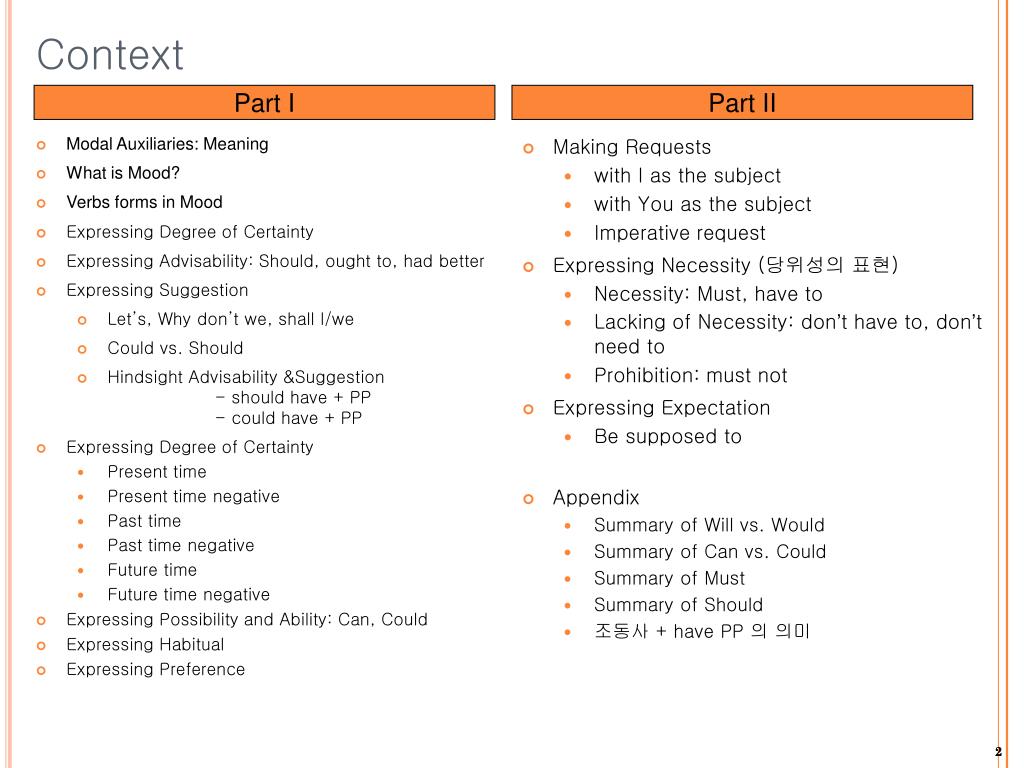
Ppt Ch 10 Modals 2 Powerpoint Presentation Free Download Id
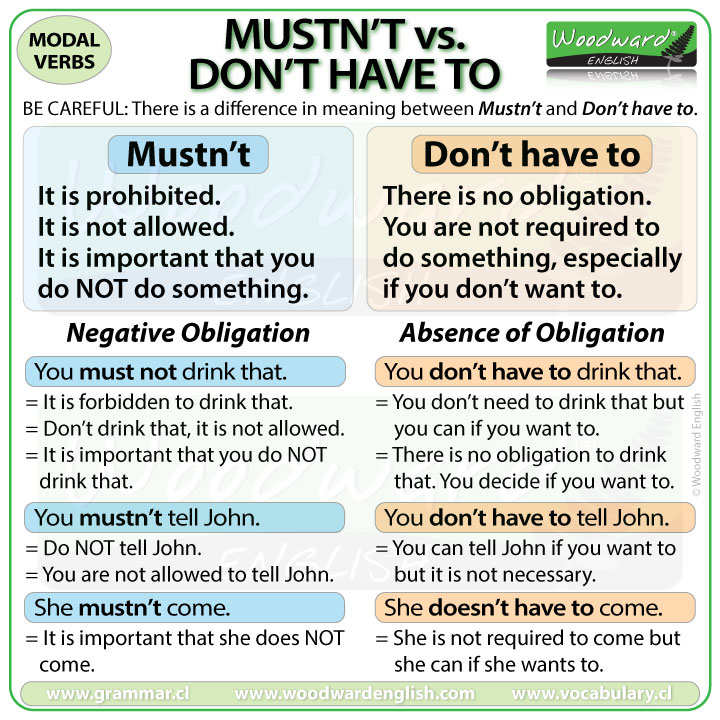
Mustn T Vs Don T Have To Woodward English

Have To Must Should Docsity
But you get the picture.
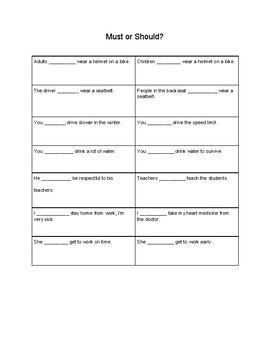
Have to vs must vs should. I must stress that this is not the actual phrase they used. On the other hand, ‘have to’ is used to indicate that the subject is bound to act in a specified manner, because of some external pressure. You ought to go to a therapist.
Must is a modal auxiliary verb. That’s the good news. Had better = used for strong advice;.
(No other exits were available.). We use 'Must' to talk about an obligation, probabil. A short video explaining the difference between the modal verbs of obligation, "must" and "have to." Practice here:.
You must stop smoking. Must have expresses an opinion about an earlier (past) situation. The correct form is “Must Have” but I must admit I hear or read that rarely and almost always hear or see “Must Of” recently which sounds awful.
HAVE TO Summary Chart. (A) he must be:. As for should, it is only used as a verb.
Could Should Would + Verb3 Can / Can't Subject Exercises:. (=advice) You must be patient with me. They used more business-like phrases.
I must go now. He has to be:. Yesterday I _____ finish my geography project.
But there are some small differences in connotation and how we use them. Must vs Have/Has To Exercise 1 Must vs Have To Exercise 2 Mustn't vs Don't Have to Must/Mustn't vs Needn't vs Have to Examples Sentences Teacher :. While ''have to'' sounds more like a compulsion to which there may even be penalty / punishment, ''should'' signifies the onus of doing something that may display how responsible someone is.
What, then, is the difference between “shall” and “should”?. (sound) The car passengers must have escaped out the back. Mum should of gone to Iceland.
"I had a terrible stomachache." "You should have gone to the doctor’s." "I didn’t hear from my father last week." "You should have called him." "She isn't happy with the salary she’s getting." "She shouldn't have accepted. She will _____ wait in line like everyone else. I must call the electrician and get that light fixed.
1) They must be playing in the garden now. MUST is used when expressing obligation or an unavoidable requirement, whereas SHOULD is more of a recommendation, or simply a desirable goal. These are not common, but need to be used in some cases.
Must not have, mustn't have If other tenses are required, the speaker or writer must use forms of the synonymous modal verb " have to ". It indicates the exigency of an act. Moreover, “shall” is used to express offers and.
As verbs the difference between must and will is that must is to do with certainty;. So, it is obvious that the degree of emphasis is least when we use should in our sentence. Must mustn't had to a) must b) mustn't c) had to.
Have to is NOT an auxiliary verb (it uses the verb have as a main verb). (=strong advice) ought to/ought not to = should/shouldn’t Ought to has the same meaning as should, although it is more formal and not as common. The modal should Express opinion, one person’s point of view.
‘Must’ and ‘should’ are both modal verbs. Here are some examples of other modal verbs:. 'Must', 'have to', and 'need to' in the positive or question form are used to speak about responsibilities, obligations and important actions.
You have to put on uniform at school. So, if you study hard, you can be sure to clear it. By most modern understandings, have to and must imply compulsion, should implies obligation without compulsion, and shall implies firm intention or commitment - or is just used in place of will to lend a certain air to the text or speech.
Read the explanation to learn more. How about the following sentence?. Have to Both Must and have to express obligation or necessity, but there are some small differences:.
She has to work with clients from all over the world. The car driver must have panicked when he saw the buses moving in on both sides. Should have Nós usamos "should have" para dar, ou pedir uma opinião no presente sobre algo que aconteceu no passado:.
My hair is the evidence, “You must have hair gel in your hair” and my friend who says he has been driving for 16 hours, “You must be exhausted.” So, hopefully that has given you an introduction to the difference between must and have to. The difference between MUST and SHOULD Must and Should are both modal verbs. Must and have to are both used to talk about obligations:.
As nouns the difference between must and will is that must is something that is mandatory. You can do this grammar quiz online or print it on paper. Requirements Terminology – Defining MUST, SHOULD and MAY.
You mustn't worry about me. I said the above as I am certain that they are playing with the neighbour's children in the garden. Also, it’s important to note that there is no past tense form of “must”, so if you want to talk about obligations in the past, you should use “had to”.
Same as 'he must be' (less used alternate, in my opinion) (B) he should be:. In contracts, standard documentation and various other specialised usages have their own understandings of the term. Can vs Could Exercise 4.
Ke-empat kata tersebut memiliki arti atau makna yang sama yaitu harus atau musti. Namun, dalam bahasa inggris, ke-empat kata tersebut tetap saja memiliki penggunaan yang berbeda-beda antara satu dan lainya. (=advice) You must be patient with me.
You have to give your report by 5 p.m. Try this exercise to test your grammar. So I could simply use the second sentence.
You should be patient with me. I have a couple of well-educated ex-colleagues who shall remain nameless who, in the written form, have started using the phrase should of, in the following context:. The principal use of must is as a verb that is discussed in this article.
On May 2, 11 at 3:08 pm. Improve your English grammar with this quiz. You ought to go to a therapist.
If you say, We must talk to her before she leaves, you mean that you think this is very important, and you need to do it. They are both followed by the infinitive. We include have to here for convenience.
Should is not as strong as must or have to. It is his duty to be Choose according to context. This modal auxiliary has all normal tenses, including progressive or continuous forms;.
“Must Of” sounds to me as though a drunken person is mumbling and is also rather dfficult to articulat. We use should to suggest something. It tests what you learned on the have to, must page.
Must = used for strong advice, obligation, and rules;. Have to for objective obligation. We use have to / must / should + infinitive to talk about obligation, things that are necessary to do, or to give advice about things that are a good idea to do.
On the other hand, ought to is less emphatic than must, but more than should. Make sure to point out that 'have to' is used for daily routines while 'must' is used for strong personal obligation. MUST is used when expressing obligation or an unavoidable requirement, whereas SHOULD is more of a recommendation, or simply a desirable goal.
The word “shall” is more commonly used in formal or legal writing. It is also used to emphasize a strong determination that a future event will occur. She has to buy new dictionary for school.
(=strong advice) ought to/ought not to = should/shouldn’t Ought to has the same meaning as should, although it is more formal and not as common. When you say, I have to go into work early tomorrow, you mean that. Then, must is also used as a noun in three different contexts with three different meanings.
There is a small difference between how we use the semi-modal verb had better compared to other modal verbs like have to/must or should. Must is used more in formal writing, especially in written notices, rules or instructions. Should have We use "should have" to give, or ask for, an opinion in the present about something which happened in the past:.
Should has its origin in the Old English word sceolde. In this lesson we look at have to, must and must not, followed by a quiz to check your understanding. One of the problems of working with the PRINCE2 practitioners is that the people tend to get highly focussed on definitions in the Scope of Works.
You don't have to have a licence to cycle on the roads. Have to = used for strong advice, obligations, and rules;. Must / Mustn't / Needn't / Have to 12-13.
“ It is advisable to …. You should be patient with me. Discuss the differences between 'have to' and 'must' in the positive form.
Can, could, shall, should, ought to, will, would, and might. An inference, a conclusion, based on known details. In general, Have to is more frequent in conversation (or spoken English) than Must.
(indicates that the speaker is certain that the subject will have executed the predicate) or must can be to make musty while will is (archaic) to wish, desire or will can be (rare|transitive) to wish, desire (something). Must, have to, should dan should have merupakan bagian dari modal dalam bahasa inggris. Should have or ought to have express options that were not taken in the past.
It should be noted that “have to” functions as a verb. Th September 11 By Greg Ferro Filed Under:. We use the word ‘must’ to show the indispensability of something.
Should is not as strong as must or have to. When speaking to elders, or to persons in authority, 'should' is more polite. – it is most important and necessary to clear the exam and hence there is no choice but to study hard for it.
Generally, they all mean that you’re talking about a responsibility, an obligation, or something that is important to do. We use 'Should' to give advice, to make recommendations or to talk about what we think is right or wrong. I'm having some trouble understanding this.
''Should'' finds usage to refer to an ethical responsibility. Mus t and have to are both used for obligation and are often quite similar. 1) The only possible conclusion from the evidence is that he is 2) He is obliged to be;.
Have them make a list of five things that they have to do every day. Must is known as a modal verb in the English language while have to is a verb. Had better is used to give strong advice.
I must ask Peter a few questions. You must do your homework now. In English, the word “must” is more formal than “have to”.
"I had a terrible stomachache." "You should have gone to the doctor’s." "I didn’t hear from my father last week." "You should have called him." "She isn't happy with the salary she’s getting.". Advice, Have, Modal Verbs, Must, Obligation. Must can be used as synonyms.
I believe the first and the second sentences have no difference in the meaning;. • Must expressa os sentimentos do locutor, enquanto have to expressa, sobretudo, uma ideia impessoal:. In fact, it can be said that must and have to are two different words that give different senses and not the same meaning.
Must – you must study hard to clear the exam. This is where they are similar. Must and Have To.
I have to go into work early tomorrow. Plus, quite often, must obligations come from outside (fate, weather, boss, parents, mullah -- somebody or something who or which can enforce the order), while should obligations come from your own conscience, or from people who seem to care about you. They are used to with other verbs to express ideas like possibility and necessity.
The difference between MUST and SHOULD:. The probability of “must” is much more than that of “should.” For instance:. "Have to" implies the necessity behind the requirement of doing a particular task.
The bus passengers must have heard a crunch. Can Can't Exercises 5-6-7 Mustn't vs Don't Have to Exercises 1 / 2 / 3 8-9-10 Must vs Have to / Has to Exercises 1 / 2 / 3 11. Have to, must Quiz.
It introduces a law, rule, or an obligation. You must listen to me carefully. “Have to” serves to convey the idea of necessity.
In both sets of examples, the first interpretation is indicated. Things you cannot choose not to do. Modals With Passive Voice 1 / 2 14.
1) It is probable that he is. Must expresses an opinion:. • Must expresses the speaker's feelings, whereas have to expresses, above all, an impersonal idea:.
1 Well, in general, 'must' carries more strength and obligation than 'should'. Should = used for give advice (not as strong as the words above);. Difference between “must” and “should” in English;.
If you are speaking to an elder with whom you are familiar and usually speak with casually, 'must' is okay, but tone of voice is important. The crucial difference between should, ought to and must, is based on the extent to which they emphasize, in the sense that must is the most emphatic of the trio. Can vs Be Able To With Tenses 3.
Must test will help you practice English modal verbs, especially modals for obligation. We must talk to her before she leaves. Introduce the grammar by having the students take a look at the grammar sheet below.
“Must” is an example of a modal verb. Have To vs Must There is a slight difference between have to and must though they both seem to convey the same meaning. A Scope of Works defines what the deliverables the customer is to received.
You have to have a licence to drive a car. "It would have been a good idea, but it did not happen." "It would have been a good idea, but it did not happen." We use these words to point out errors when reviewing a situation or event. 2) They should be playing in the garden now.
Modals – permission and obligation:.
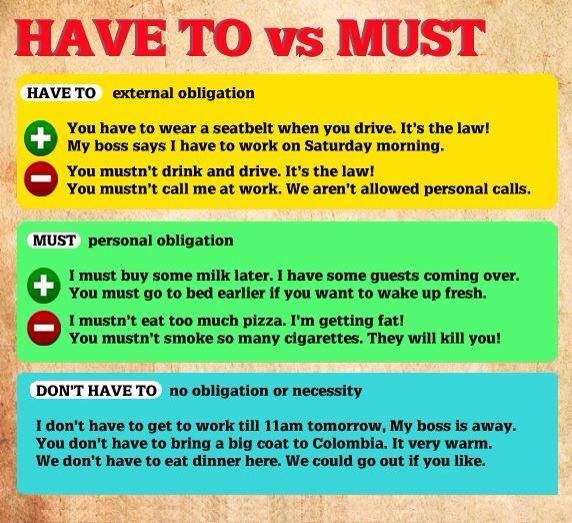
Have To Vs Must The Crazy Teacher S Blog The Crazy Teacher S Blog
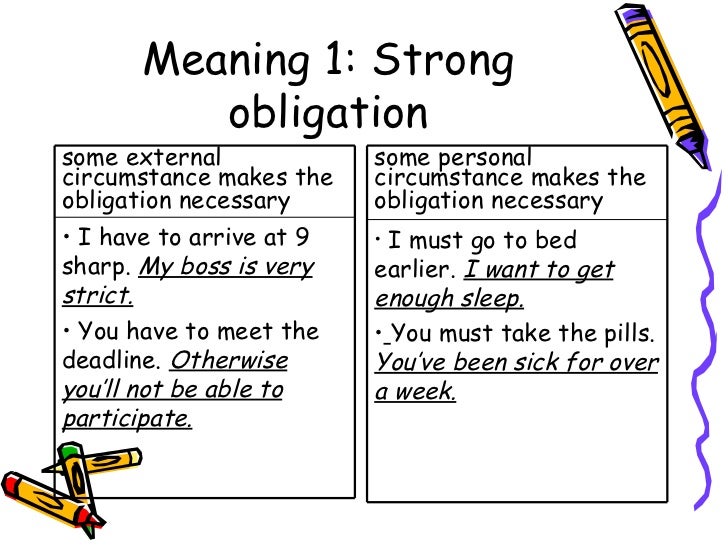
Have To Vs Must

When To Use Should And When To Use Must I Mean Both Of Them Have The Same Meaning Right Thanks Before Ask Fm The Yuniversity

Lengua Inglesa Must Vs Have To Docsity

Must Vs Have To Using Must Build Up Your English Facebook
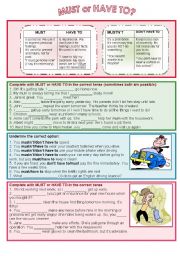
Must Or Have To Esl Worksheet By Nuria08
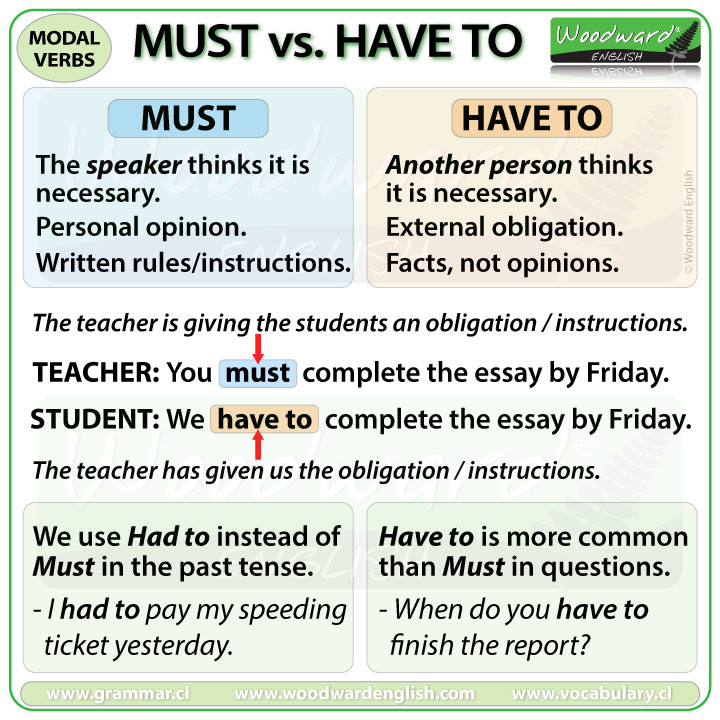
Must Vs Have To Woodward English
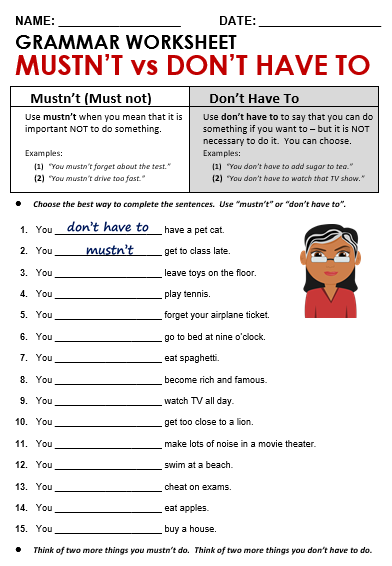
Must Necessity All Things Grammar
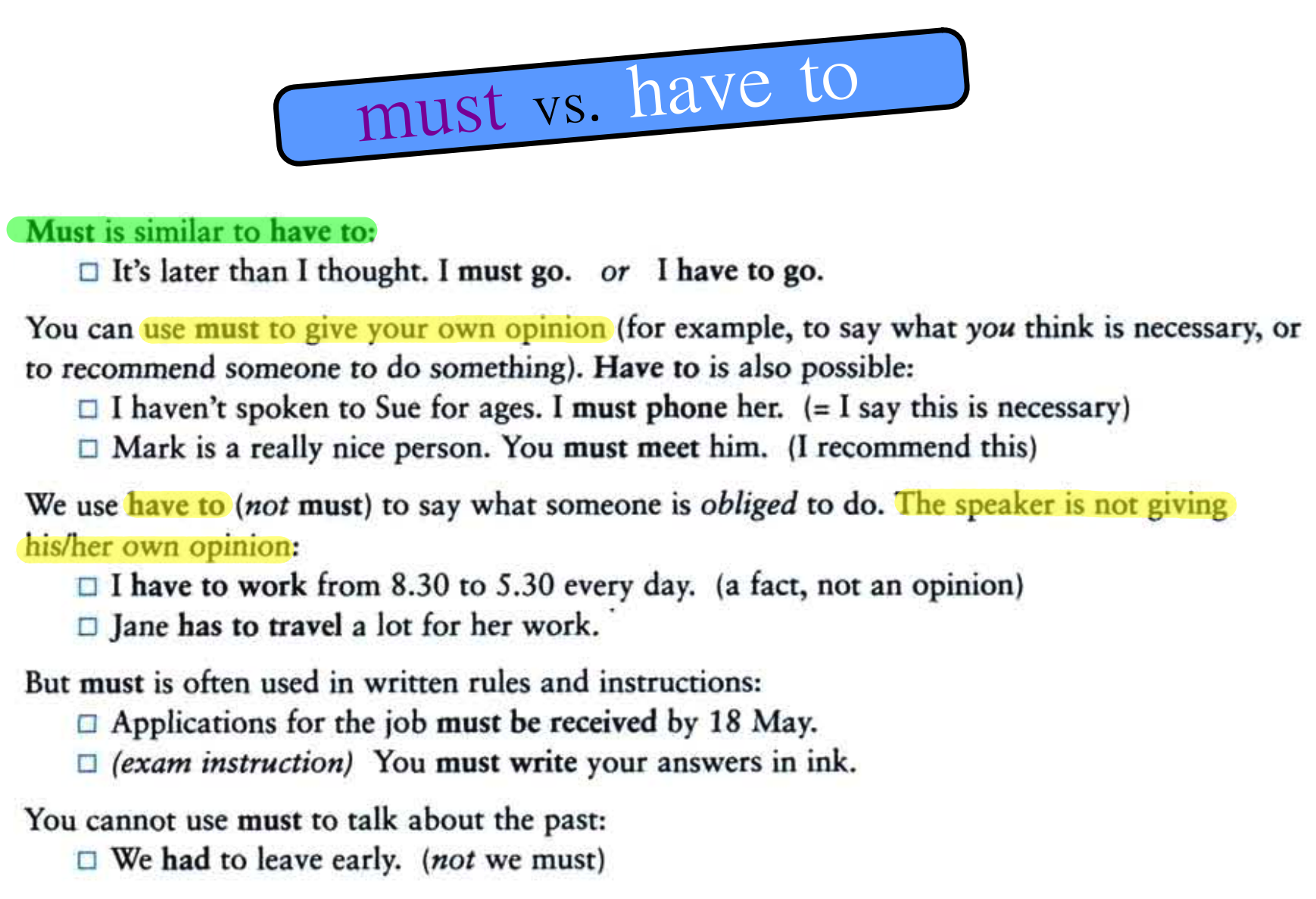
In Plain English Should Must Or Have To

Should We Do It Vs Can We Do It
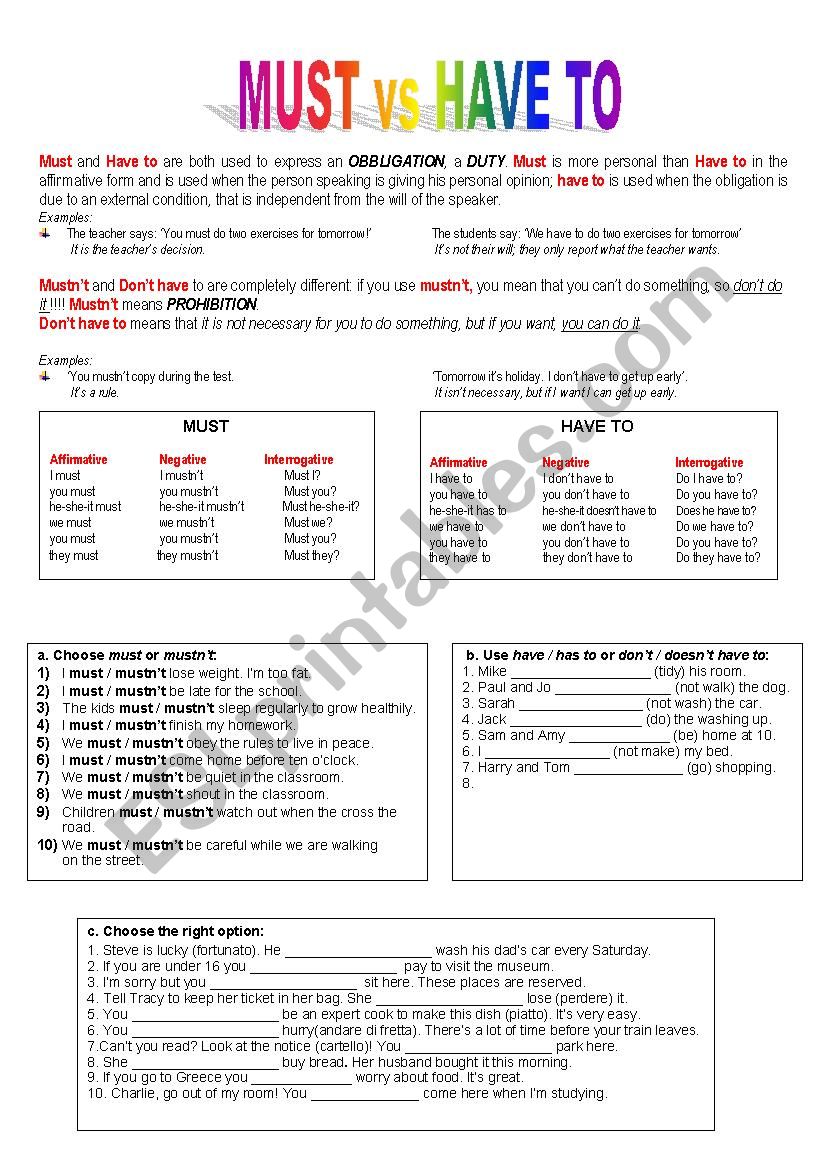
Must Vs Have To Esl Worksheet By Sarasimo97

127shares Learn The Differences Between Must Vs Have To And Mustn T Vs Don T Doesn T Have To You Can J Learn English English Writing Learn English For Free

Level 2 English Chapter 11 Must Must Vs Should Must Vs Don T Have To

What S The Difference Must Vs Have To Must Not Vs Don T Have To Teaching English Grammar Learn English English Phrases

That Vs Which When To Use Which Vs That With Useful Examples 7 E S L

Should Vs Ought To Vs Had Better United English

Pokenglish Trainers 6º

Must And Have To Difference A Free Guide Post

Must Vs Have To English Esl Worksheets For Distance Learning And Physical Classrooms

Must Vs Have To Youtube
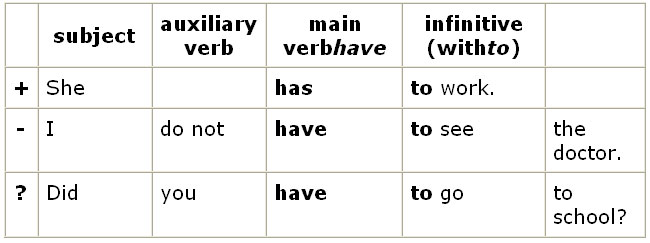
Must Vs Have To Learn English Grammar

Have To Vs Need To Vs Must What S The Difference In English Advanced English Grammar Youtube

Know Your Must Have Features Before You Begin Home Shopping

Must Vs Have To

Have To Vs Need To Vs Must What S The Difference In English
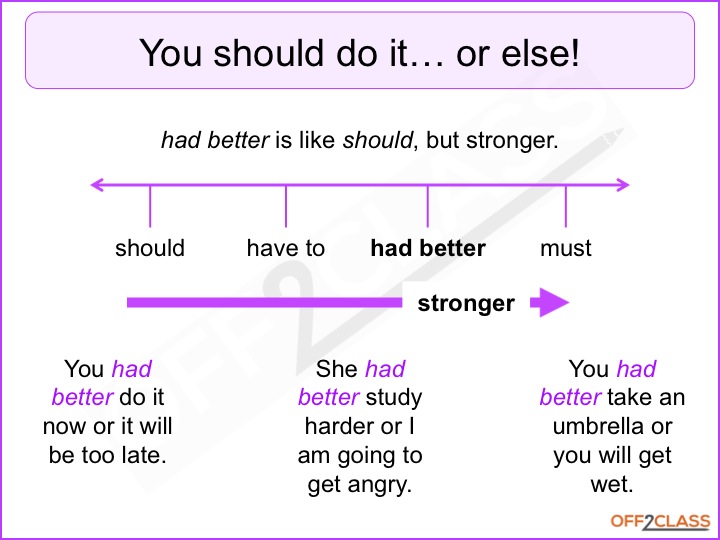
Teach Should And Ought To Advisability Modals Off2class

Modal Verbs Of Permission Lessons For English
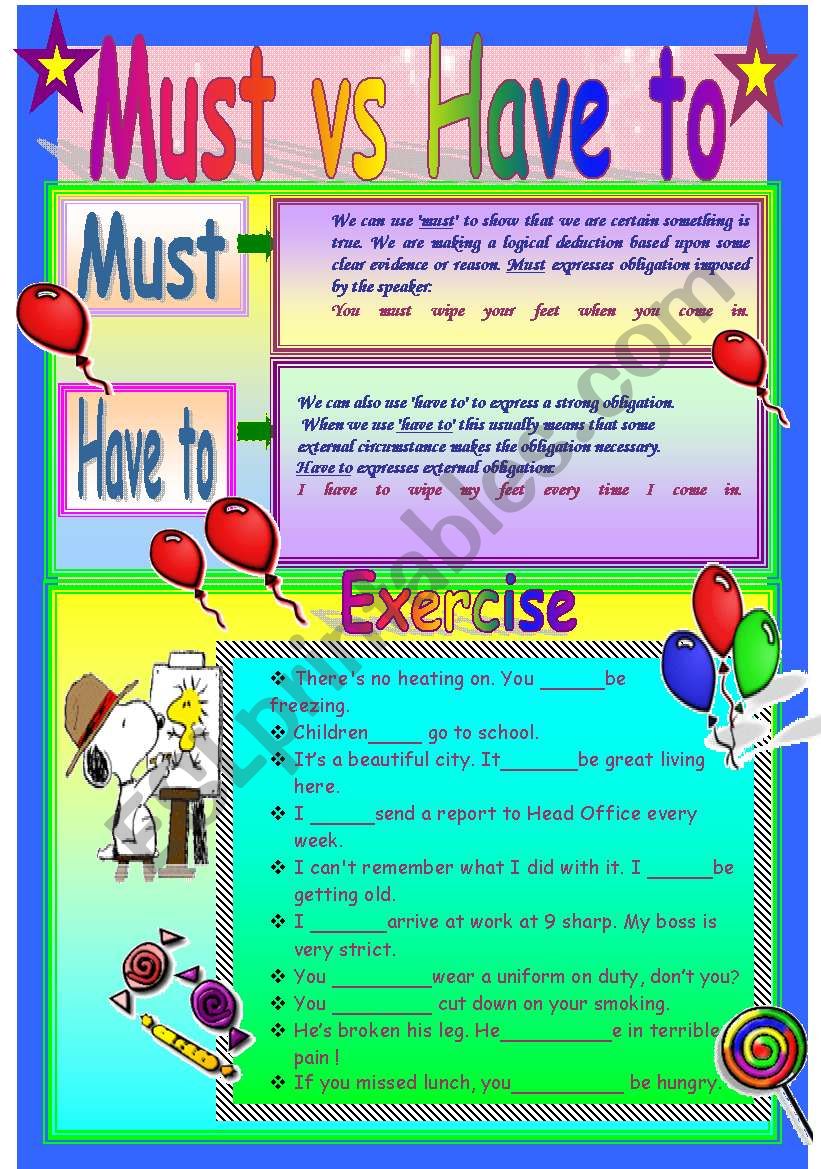
Must Vs Have To Esl Worksheet By Demmieb
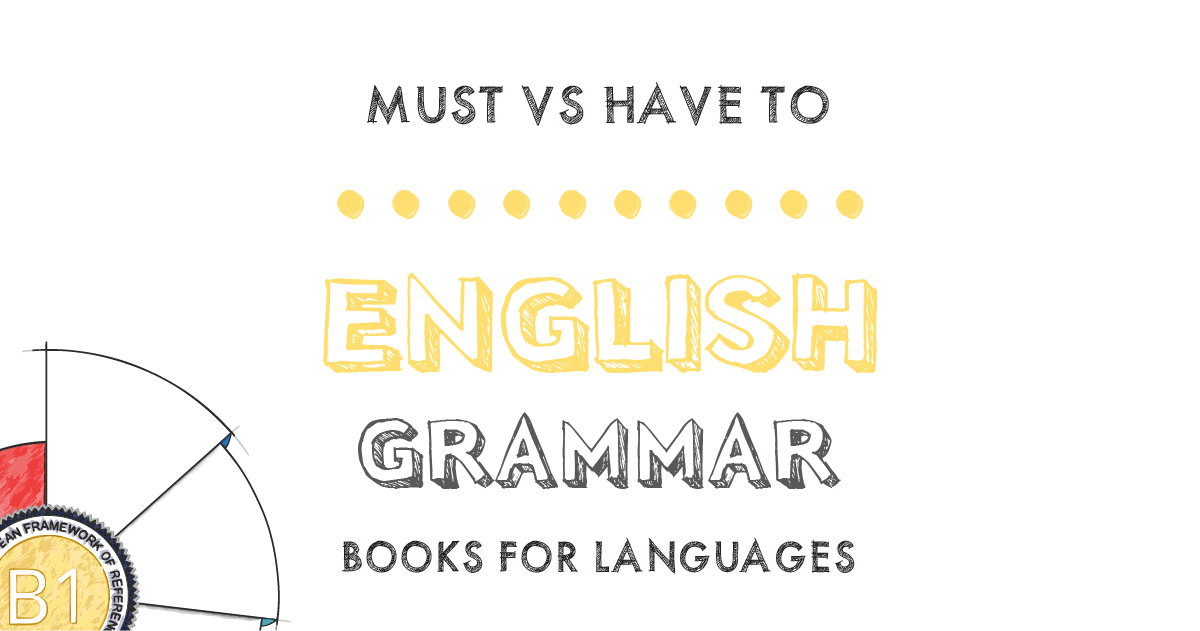
Must Vs Have To English Grammar B1 Level

Copy Of Copy Of Must Vs Have To Lessons Tes Teach
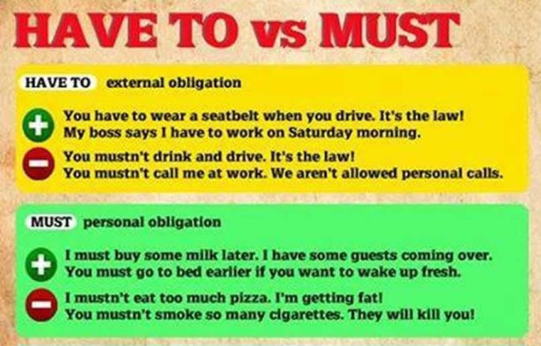
Does Have To Mean The Same As The Modal Auxiliary Must

4 Project Collaboration Solution Requirements Planview Projectplace

Must Vs Have To Lessons Tes Teach
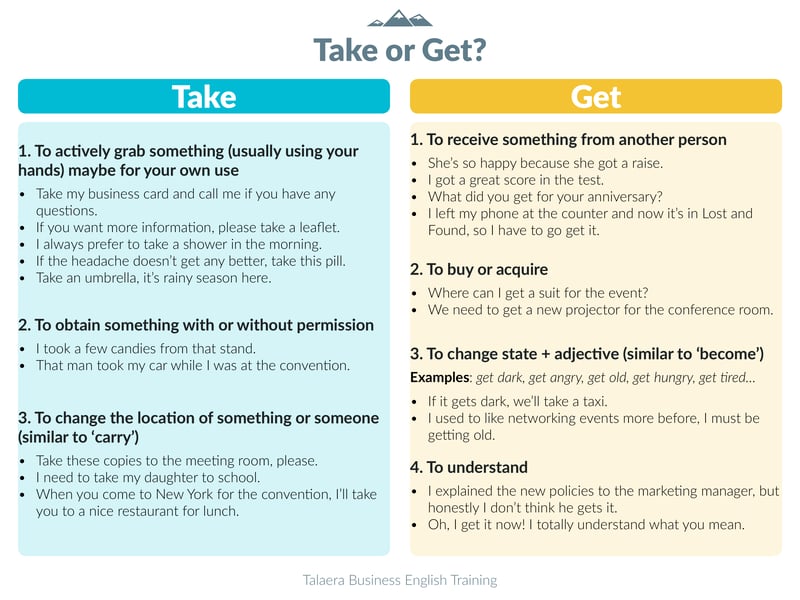
Take Vs Get Includes Examples And Exercises

What Is The Difference Between Must Mustn T And Have To Don T Have To Must Mustn T Vs Have To Don T Have To Hinative

Must Vs Have To Eduka Planet

8 Expressing Obligation And Necessity English Grammar Video Teaching
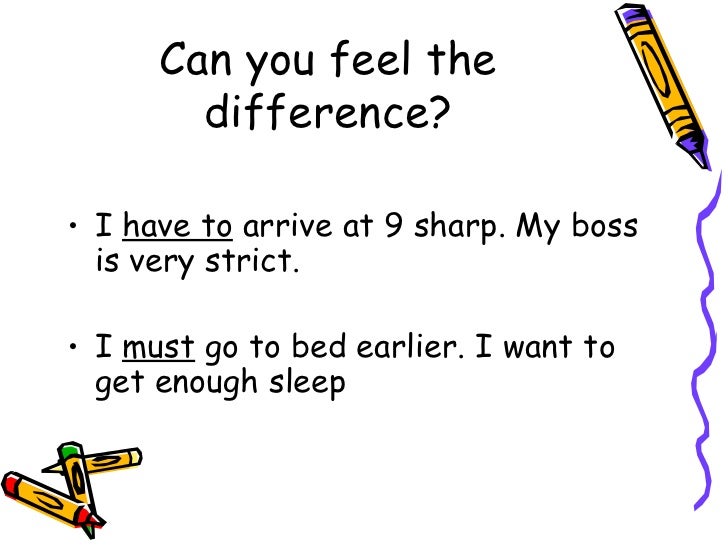
Have To Vs Must

Vmware Drs Rules Should Vs Must

Must Vs Have To In English Lessons For English

Must Vs Ought To Necessity Or Obligation What S Right And Correct Rt tcoqhasuzyqjz Meme On Awwmemes Com
Q Tbn 3aand9gcrijkykkzjpgl7kg2vfz6efmcty3xlvxi 9wyfojjc Usqp Cau

Must Vs Have To 7 Questions To Help You Use The Right Term Fluentu English
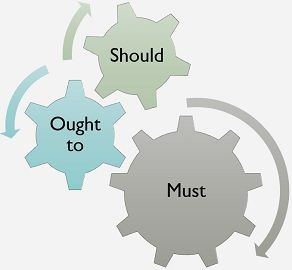
Difference Between Should Ought To And Must With Example And Comparison Chart Key Differences
Q Tbn 3aand9gctznsybspyfxmkyd8r N8mi2lbq6hzhyhrnbzlsuzndvk6fsmu4 Usqp Cau
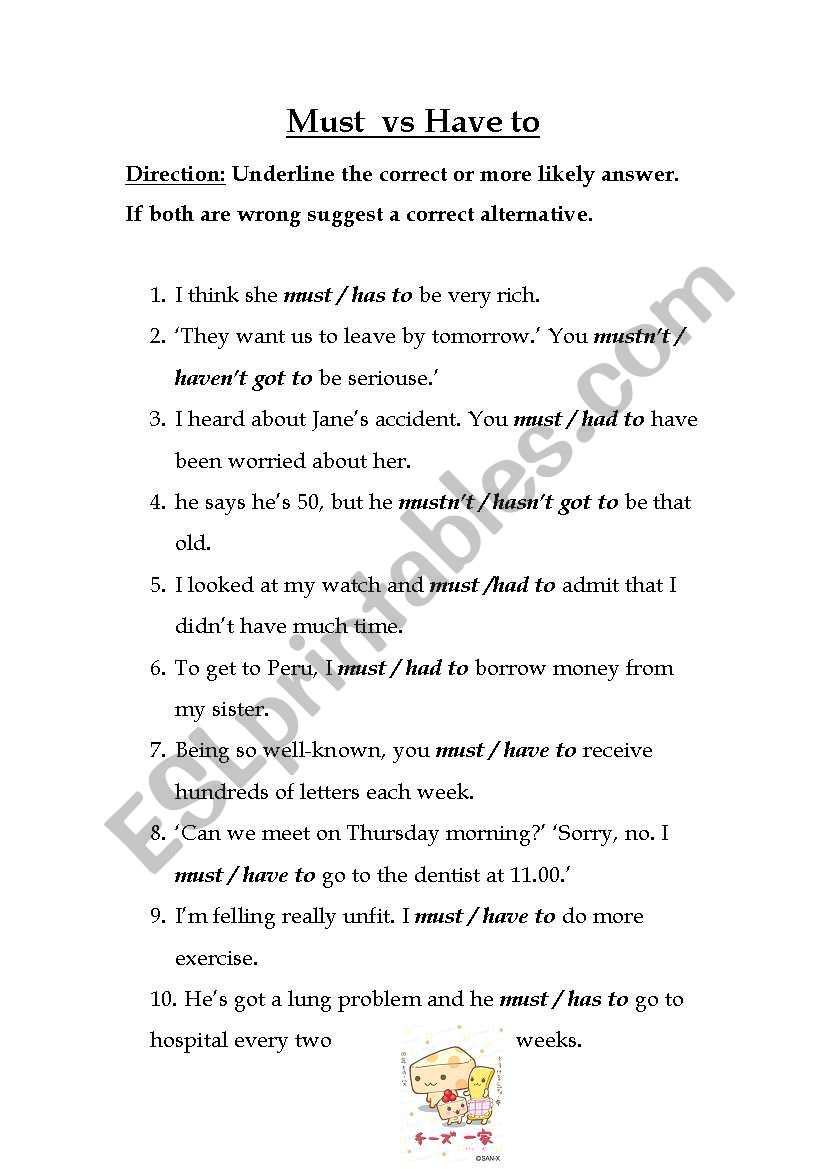
Exercise For Modals Must Vs Have To Esl Worksheet By Bambienoo

Elle Luna Should Vs Must

Should Vs Must By Teaching Enl Learners Teachers Pay Teachers

Awesome Must Vs Have To Quiz 1 English Priest

Have To Vs Must Watch This Video To Finally Learn The Difference
Anzeige Von Modal Auxiliaries As Stance Taking Devices In Linguistics Research Articles A Functional Contrastive Analysis Linguistik Online

Modals Mgr Anna Waligorska Kotfas Pwsz Konin Must Vs Have To Must Have To Has To Rules Laws General Obligation A Strong Obligation Usually Ppt Download

Must Vs Have To 7 Questions To Help You Use The Right Term Fluentu English
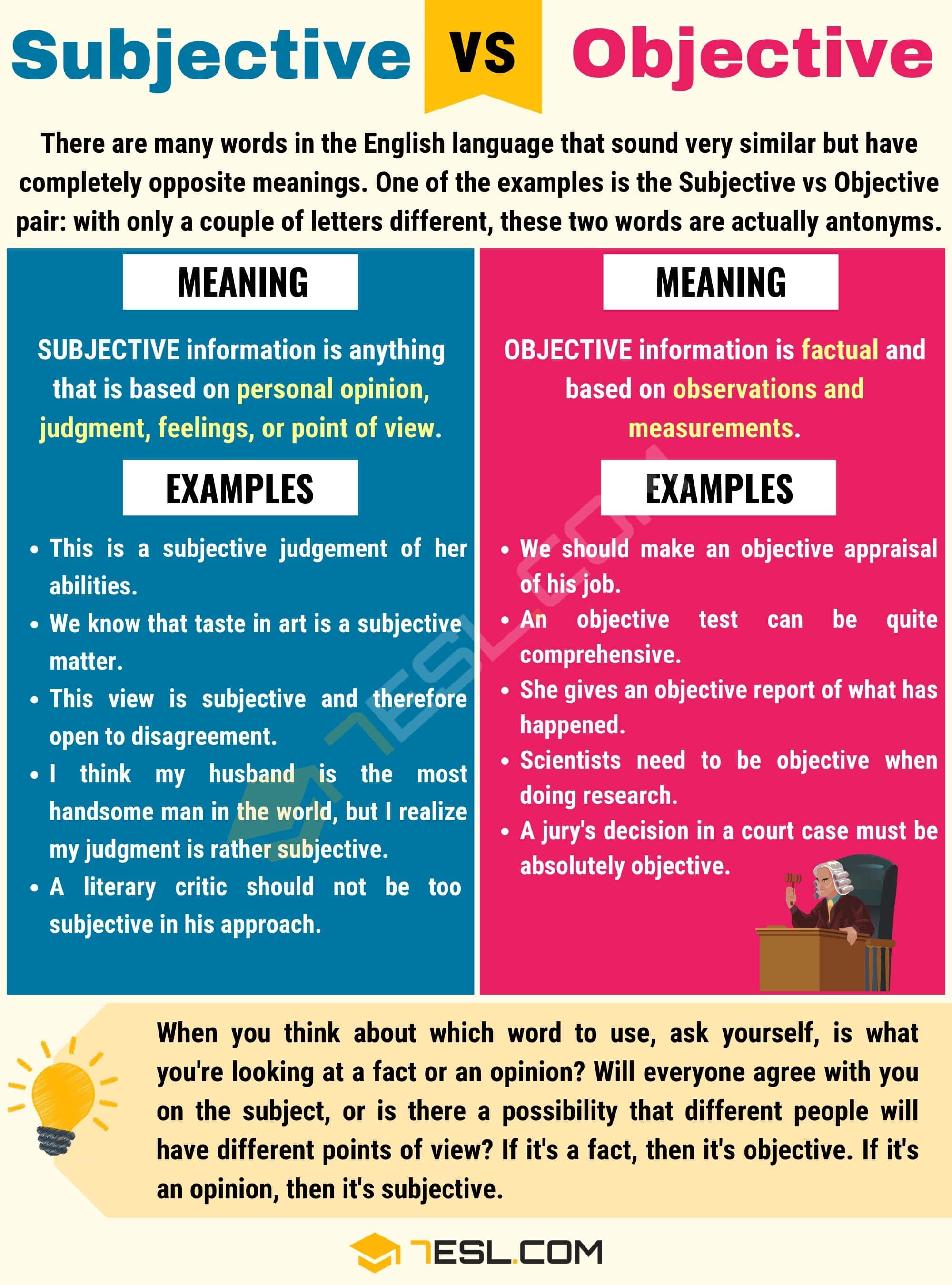
Subjective Vs Objective Differences Between Objective Vs Subjective 7 E S L

Modals 9 11 17 Lessons Tes Teach
1

Free English Language Learning Resourcesshould Vs Must Advice Recommendation Vs Obligation
.jpg)
The Change School

When To Use Should Ought To An English Grammar Video Youtube

Must Vs Have To Learn English Woodward English English Vocab
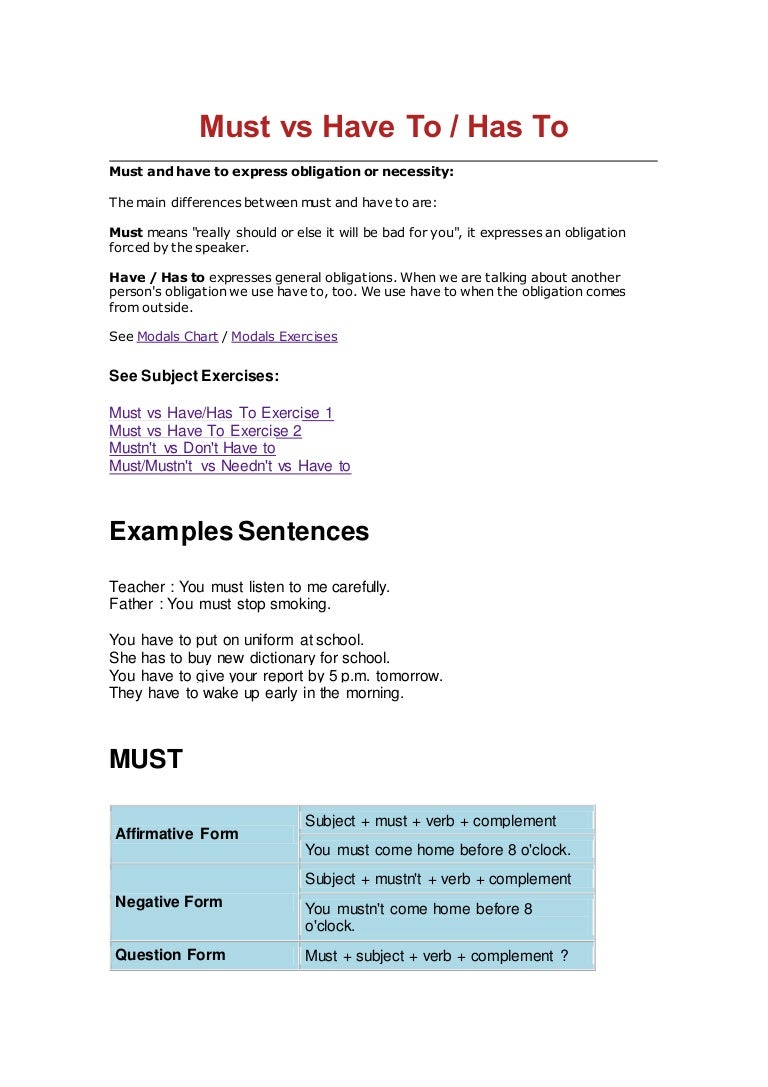
Must Vs Have To Grammar
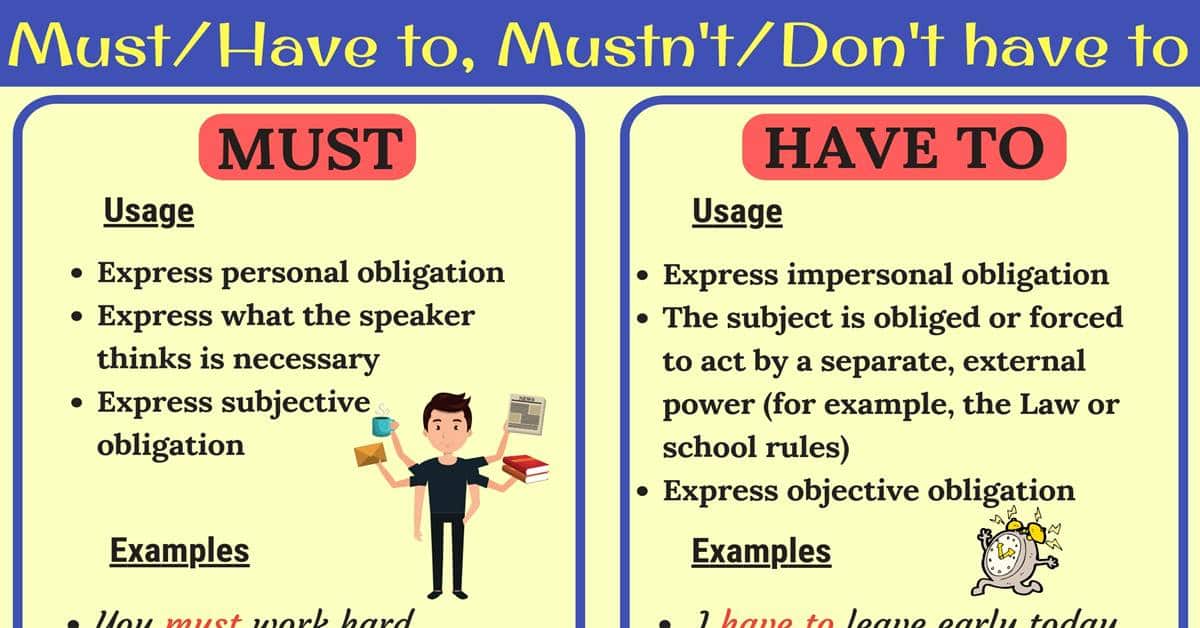
Must Vs Have To Must Not Vs Don T Have To 7 E S L

Modal Verbs Ingles

Mustn T Vs Don T Have To What Is The Difference Youtube

Must Vs Have To What Is The Difference Youtube

Must Vs Have To Must Not Vs Don T Have To 7 E S L English Grammar Rules Teaching English Grammar Learn English
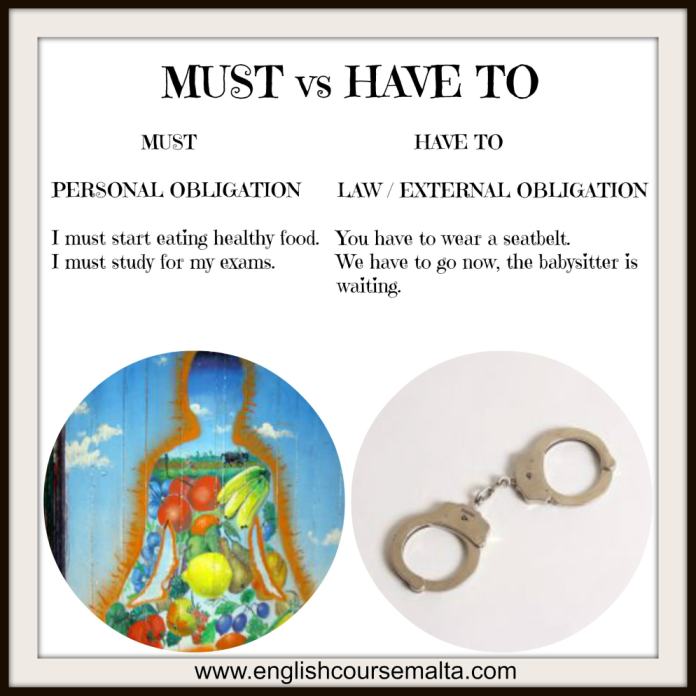
Have To Must Should English Course Malta

Should Vs Must Fifty Coffees

Urgent Care Vs Emergency Care A Difference You Must Know

Modals Must Vs Have To
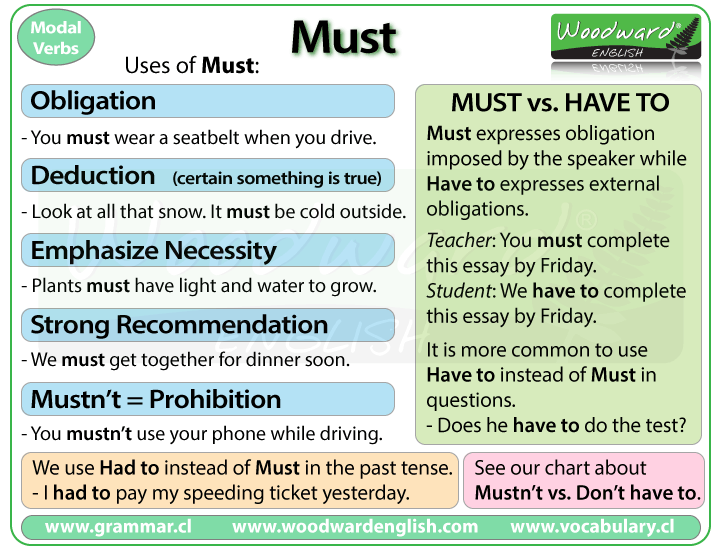
Must English Grammar

Pdf Teaching Modal Verbs Task Based Vs Traditional Approaches Semantic Scholar

The Difference Between Should And Must By Sai Krishna V K Medium
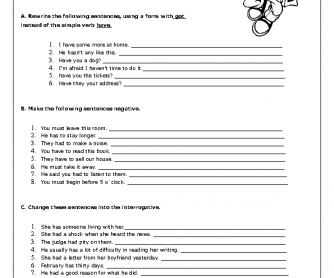
Must Mustn T Vs Have To Don T Have To Worksheet
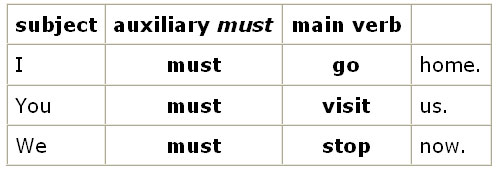
Must Vs Have To Learn English Grammar

81 Free Must Worksheets

Photos From Posts English Grammar Grammar And Vocabulary Learn English

Ppt Should Vs Must Powerpoint Presentation Free Download Id

Modal Verbs Of Obligation Must Vs Have To Interactive Worksheet

Have To Vs Must Watch This Video To Finally Learn The Difference

Test English Prepare For Your English Exam

Must Vs Have To English Grammar Worksheets English Grammar Teaching English Grammar

Modals Can T Have Must Have Might Have Grammar Businessenglish Com

Difference Between Must And Have To With Examples And Comparison Chart Key Differences

Should Vs Must Live Unbound

Shouldmusthaveto Phpapp02 Verb Language Mechanics
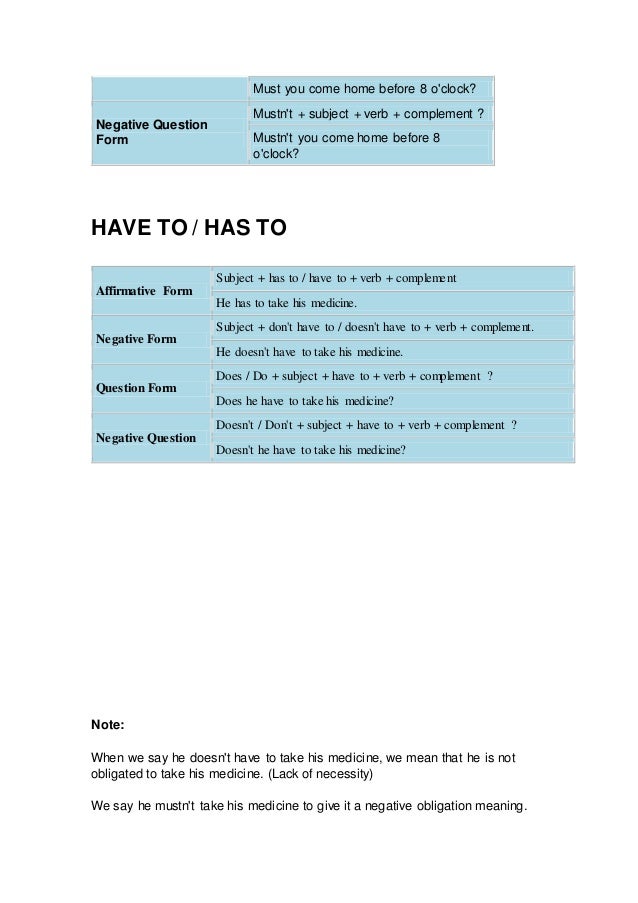
Must Vs Have To Grammar

Must Vs Have To British School Of English Facebook
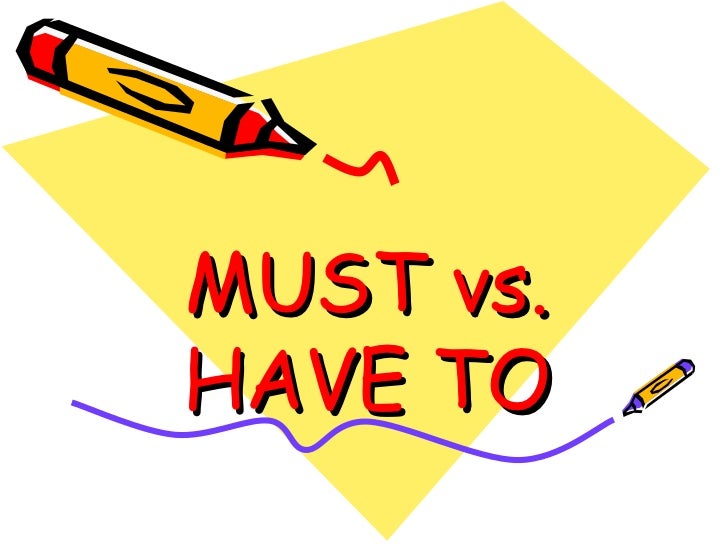
Have To Vs Must
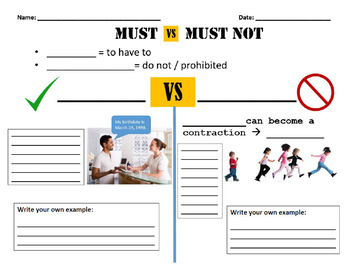
Must Vs Must Not Modal Verbs Elementary Grammar English Esl By Mary Jeannnnn

81 Free Must Worksheets
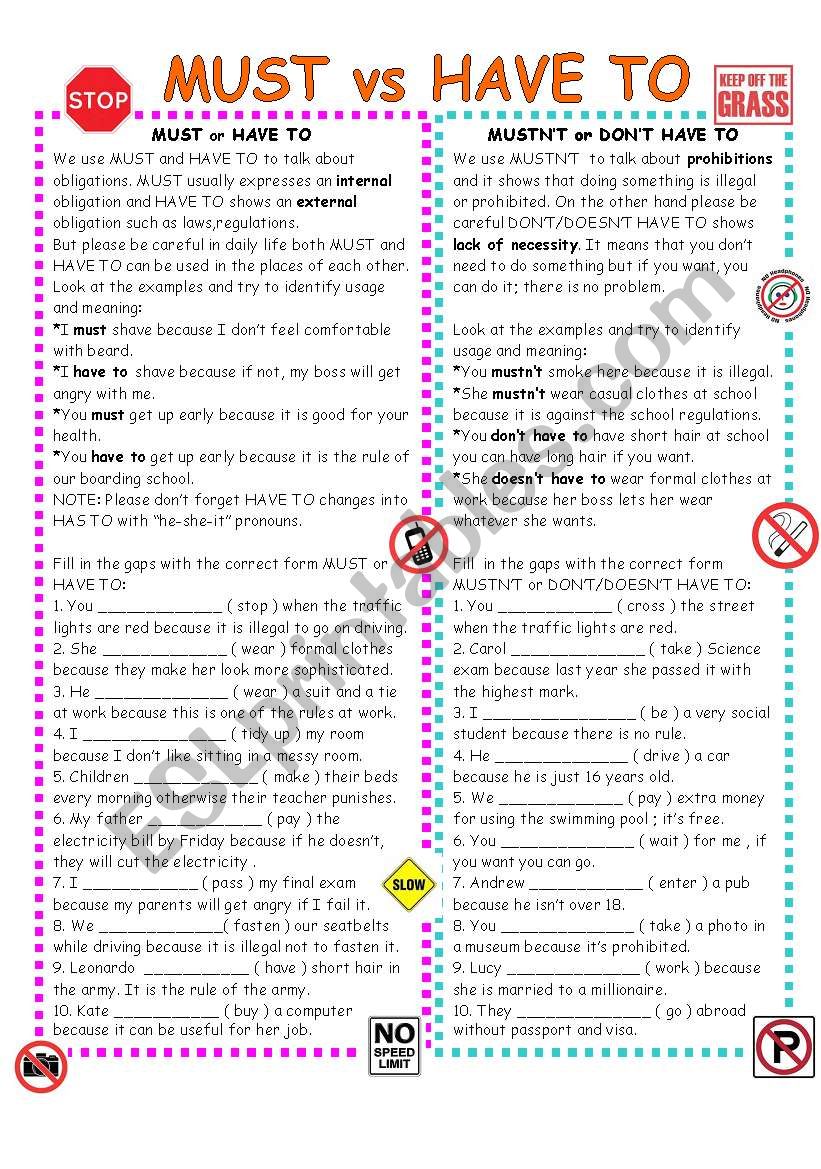
Must Or Have To Esl Worksheet By urcu
Q Tbn 3aand9gctqvykni2ndtdhuzkfapkdabu1vuq2ckdnzixrewk9ac2hp6x53 Usqp Cau

Must Vs Have To Easy English Conversation Practice Mark Kulek Esl Youtube
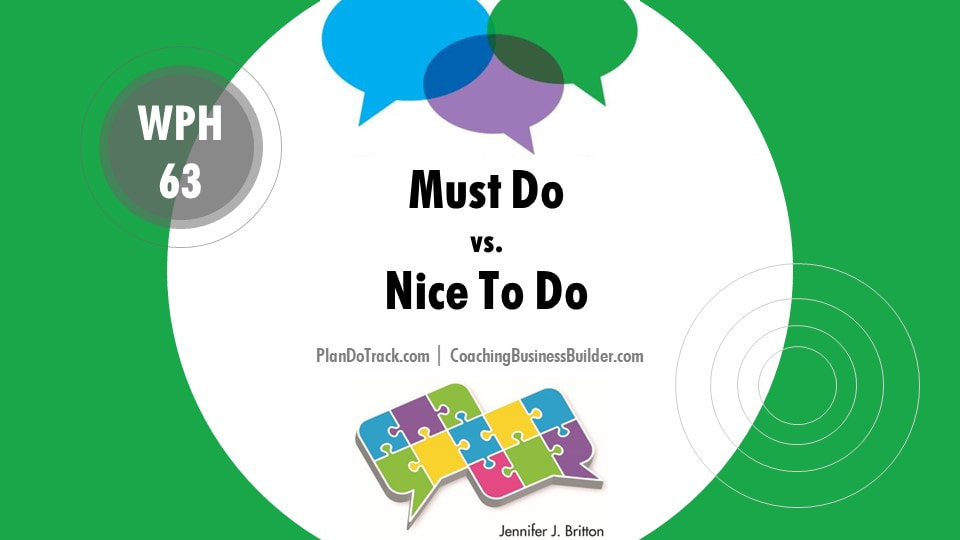
Weekly Planning Hack 63 Must Do Vs Nice To Do Priorities Plandotrack

Must Have Vs Nice To Have Requirements

Should Vs Must Shouldmust We Use Should To Suggest Something It Is Advisable To The Modal Should Expresses Opinion One Person S Point Of View Ppt Download

Modal Verbs I Must Have To Don T Have To Mustn T Ppt Video Online Download



